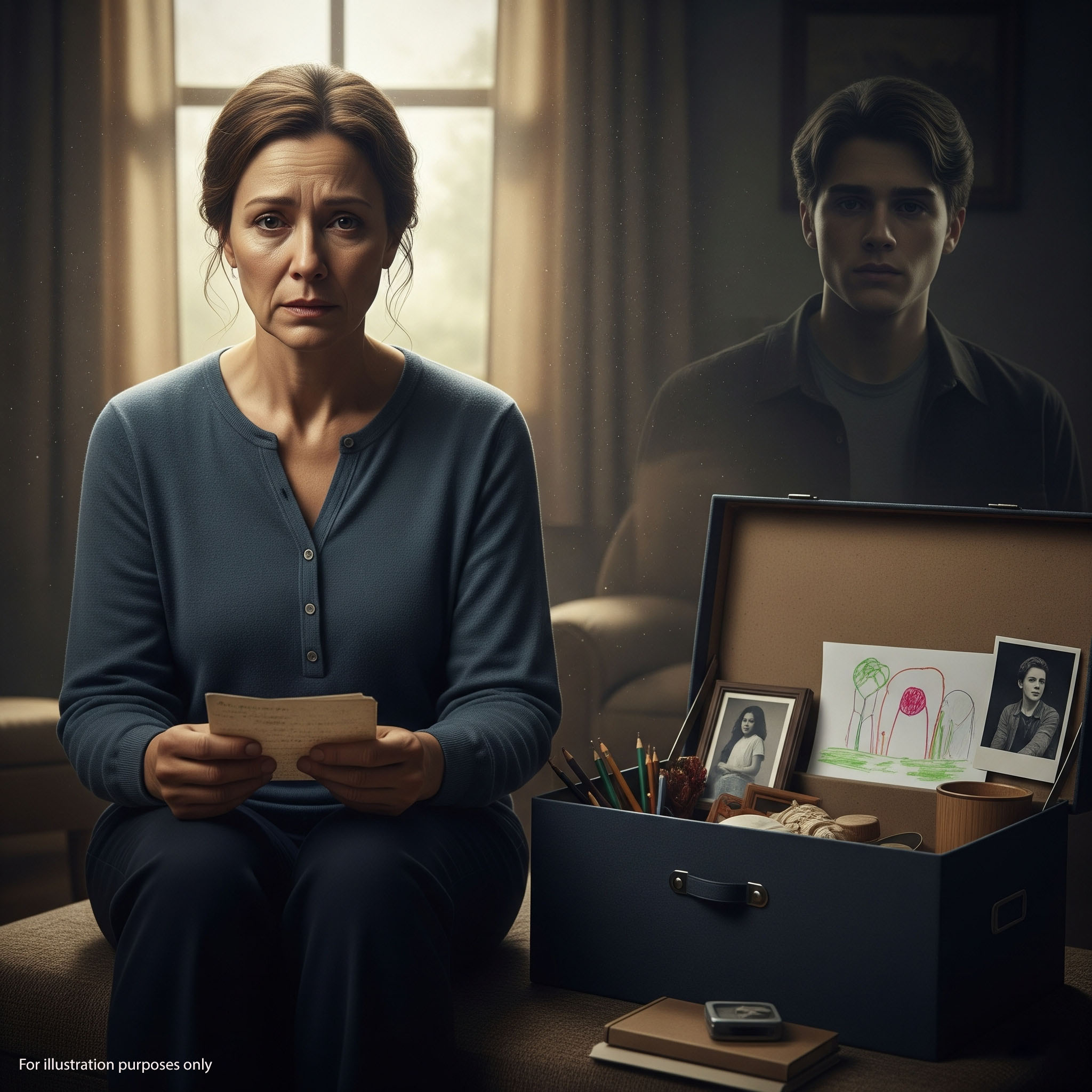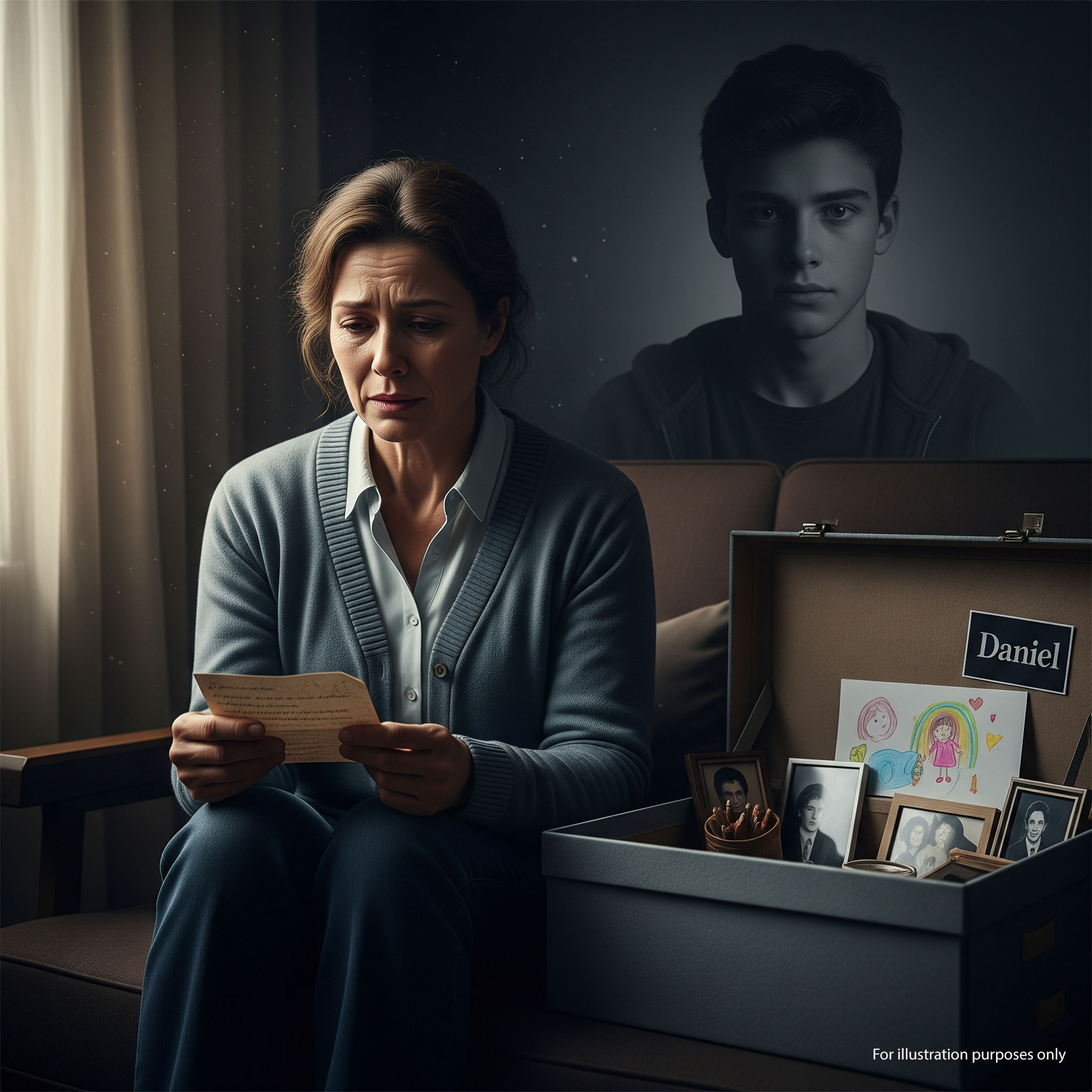The morning the world cracked open, I remember only the ringtone. Cold. Shrill. I didn’t even need to answer to know something was wrong.
“Mrs. Whitman?” a voice said. “I’m sorry… your husband, Thomas… he’s gone.”
Gone. As if a man could simply vanish.
Just twelve hours earlier, Thomas had smiled, kissed my forehead, and told me to keep dinner warm. I waited that night, replaying traffic scenarios, work delays, anything. But death? That never crossed my mind.
What followed wasn’t just grief—it was disorientation. A life vacuumed of direction, warmth, meaning. And then came the knock.
It was Daniel.

His son from a past relationship—grown now, 27, with the same sharp eyes as his father but none of the warmth. We had never connected. Too many silent dinners, too much distance. He had always looked at me like I was the intruder in his father’s life.
He stood there holding a duffel bag, rain soaking the sleeves of his coat.
“Mom kicked me out,” he said, voice low. “Can I stay here?”
I stared at him. I was 38, grieving, barely holding myself together. The insurance payout hadn’t arrived, bills were piling up, and every corner of the house whispered my husband’s name. I could barely breathe, let alone take in someone who had never really seen me.
“I… I’m sorry, Daniel. I can’t.”
He didn’t argue. Just nodded. Then turned and walked down the steps—each footfall a thud in my chest.
I never saw him again.
Ten years passed in silence.
I sold the house. Downsized. Found work at a library shelving stories that weren’t mine. I lived quietly—politely. I even dated once or twice, but I always came home to a picture of Thomas, smiling in a silver frame, as if frozen mid-sentence.
Daniel became a shadow in the back of my mind. Sometimes I wondered about him. But I convinced myself: He’s a grown man. He’ll figure it out. It wasn’t my job.
Then came the envelope.
Unmarked. Crisp. Like a whisper shoved through the mail slot.
Inside, a letter.
“You probably don’t remember me. My name is Maria. I was Daniel Whitman’s social worker years ago. He spoke of you often. I’m writing because… Daniel passed away last week. Heart failure. He was 37.”
I didn’t cry at first. I just sat there, staring. The paper blurred. My pulse roared in my ears.
Dead? Daniel?
That night, guilt crawled beneath my skin and took root in my chest.
I found Maria.
She agreed to meet in a small café on the edge of town. Her hands were gentle, her voice softer than I deserved.
“He had a hard time,” she said. “Stayed in shelters. Then got work as a janitor. Reliable. Quiet. He used to carry a photo of your husband. Always said, ‘Dad would’ve been proud.’”
I swallowed a sob.
“And me?” I asked.
Maria paused. “He said he wished it had been different. That he understood your pain.”
A week later, she called again.
“He left a storage locker. There’s something there you might want to see.”
The facility was quiet. Concrete walls, fluorescent lighting, cold metal.
I opened the unit.
Two boxes. A stack of books. And a faded duffel bag I hadn’t seen in a decade.
Inside was a notebook. A simple spiral-bound thing. I sat cross-legged on the floor and flipped it open.
August 18th
She couldn’t let me stay. It’s okay. She lost Dad. I probably reminded her of him too much.
December 25th
Left a flower outside the old house. I wonder if she saw it. Merry Christmas, I guess.
March 22nd
Passed my GED today. Thought about writing her. Didn’t.
July 9th
Promoted at work. Dad would’ve liked that. I hope she’s doing okay.
October 4th
Ten years. I wish I could’ve said goodbye.
By the time I reached the final page, my hands were trembling.

I had turned away a boy—no, a man—who didn’t need rescuing. He only needed a place. A name spoken kindly. A gesture that said: You belong here, too.
I organized a small memorial.
Nothing grand. A circle of folding chairs at the local church. Maria came. A few coworkers. Even some people from the shelter. I read his journal aloud.
When I finished, the room was silent. Not out of awkwardness—but reverence. As if we were all holding the weight of a soul too often overlooked.
That night, back in my kitchen, I held the journal like it was a relic.
“I’m sorry, Daniel,” I whispered. “I didn’t see you. But I do now.”
I couldn’t rewrite the past.
But I could stop another Daniel from falling through the cracks.
I started volunteering at a youth shelter. I sat with kids who had nowhere else to go. I listened. I remembered. I made room.
And sometimes, late at night, I dream of Thomas standing in a field of sunlight. Daniel beside him, whole again.
They don’t speak. They just look at me.
And smile.
As if to say:
“You found your way back. That’s all we ever wanted.”